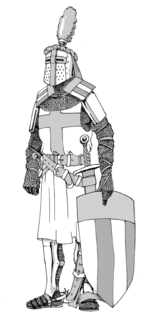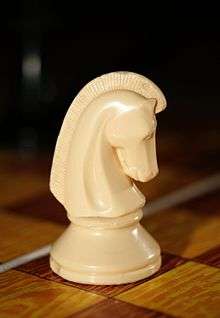Definify.com
Webster 1913 Edition
Knight
Knight
,Noun.
[OE.
knight
, cniht
, knight, soldier, AS. cniht
, cneoht
, a boy, youth, attendant, military follower; akin to D. & G. knecht
servant; perh. akin to E. kin
.] 1.
A young servant or follower; a military attendant.
[Obs.]
2.
(a)
In feudal times, a man-at-arms serving on horseback and admitted to a certain military rank with special ceremonies, including an oath to protect the distressed, maintain the right, and live a stainless life.
(b)
One on whom knighthood, a dignity next below that of baronet, is conferred by the sovereign, entitling him to be addressed as Sir; as, Sir John.
[Eng.]
Hence:
(c)
A champion; a partisan; a lover.
“Give this ring to my true knight.” Shak “In all your quarrels will I be your knight.” Tennyson.
Knights
, by their oaths, should right poor ladies’ harms. Shakespeare
☞ Formerly, when a knight's name was not known, it was customary to address him as Sir Knight. The rank of a knight is not hereditary.
3.
A piece used in the game of chess, usually bearing a horse's head.
4.
A playing card bearing the figure of a knight; the knave or jack.
[Obs.]
Carpet knight
. See under
– Carpet
. Knight of industry
. See
– Chevalier d'industrie
, under Chevalier
. Knight of Malta
, Knight of Rhodes
, Knight of St. John of Jerusalem
See
– Hospitaler
. Knight of the post
, one who gained his living by giving false evidence on trials, or false bail; hence, a sharper in general.
Nares.
“A knight of the post, . . . quoth he, for so I am termed; a fellow that will swear you anything for twelve pence.” Nash.
– Knight of the shire
, in England, one of the representatives of a county in Parliament, in distinction from the representatives of cities and boroughs.
– Knights commanders
, Knights grand cross
different classes of the Order of the Bath.
See under Bath
, and Companion
. Knights of labor
, a secret organization whose professed purpose is to secure and maintain the rights of workingmen as respects their relations to their employers.
[U. S.]
– Knights of Pythias
, a secret order, founded in Washington, D. C., in 1864, for social and charitable purposes.
– Knights of the Round Table
, knights belonging to an order which, according to the legendary accounts, was instituted by the mythical King Arthur. They derived their common title from the table around which they sat on certain solemn days.
Brande & C.
Knight
,Verb.
T.
[
imp. & p. p.
Knighted
; p. pr. & vb. n.
Knighting
.] To dub or create (one) a knight; – done in England by the sovereign only, who taps the kneeling candidate with a sword, saying: Rise, Sir –-.
A soldier, by the honor-giving hand
Of Cœur-de-Lion
Of Cœur-de-Lion
knighted
in the field. Shakespeare
Webster 1828 Edition
Knight
KNIGHT
,Noun.
1.
Originally, a knight was a youth, and young men being employed as servants, hence it came to signify a servant. But among our warlike ancestors, the word was particularly applied to a young man after he was admitted to the privilege of bearing arms. The admission to this privilege was a ceremony of great importance, and was the origin of the institution of knighthood. Hence, in feudal times, a knight was a man admitted to military rank by a certain ceremony. This privilege was conferred on youths of family and fortune, and hence sprung the honorable title of knight, in modern usage. A knight has the title of Sir.2.
A pupil or follower.3.
A champion.Knight of the post, a knight dubbed at the whipping post or pillory; a hireling witness.
Knight of the shire, in England, one of the representatives of a county in parliament, originally a knight, but now any gentleman having an estate in land of six hundred pounds a year is qualified.
KNIGHT
,Verb.
T.
Definition 2025
Knight
knight
knight
See also: Knight
English

a knight (warrior)

a knight (chess)
Noun
knight (plural knights)
- A warrior, especially of the Middle Ages.
- King Arthur and the Knights of the Round Table
- A young servant or follower; a military attendant.
- Nowadays, a person on whom a knighthood has been conferred by a monarch.
- (chess) A chess piece, often in the shape of a horse's head, that is moved two squares in one direction and one at right angles to that direction in a single move, leaping over any intervening pieces.
- (card games, dated) A playing card bearing the figure of a knight; the knave or jack.
Synonyms
- (chess piece): horse (rare)
Derived terms
Terms derived from the noun knight
|
|
|
See also
| Chess pieces in English · chess pieces, chessmen (see also: chess) (layout · text) | |||||
|---|---|---|---|---|---|
| |
|
|
|
|
|
| king | queen | castle, rook | bishop | knight | pawn |
- Appendix:Chess_pieces
Translations
warrior, especially of the Middle Ages
|
|
person on whom a knighthood has been conferred
|
|
chess piece
|
|
Etymology 2
From Middle English knighten, kniȝten, from the noun. Cognate with Middle High German knehten.
Verb
knight (third-person singular simple present knights, present participle knighting, simple past and past participle knighted)
- (transitive) To confer knighthood upon.
- The king knighted the young squire.
- (chess, transitive) To promote (a pawn) to a knight.
Synonyms
Derived terms
Translations
to confer a knighthood upon
|
|